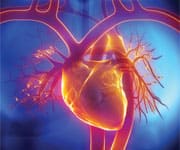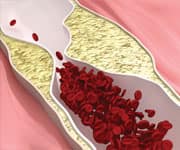Life Extension Magazine®
Higher CoQ10 and B6 Levels Linked to Reduced Coronary Artery Disease Risk | |
A recent study performed by scientists at the School of Nutrition, Chung Shan Medical University, Taichung, Taiwan, investigated the relationship between plasma levels of coenzyme Q10 and vitamin B-6 and the risk of coronary artery disease.* The study was comprised of a control group of healthy people with normal blood biochemistry and a case group comprised of patients with at least 50% stenosis of one major coronary artery identified by cardiac catheterization. The scientists discovered that there was a correlation between higher plasma levels of coenzyme Q10 and vitamin B-6 and a reduced risk of coronary artery disease. Further study is needed to examine the benefits of administering coenzyme Q10 in combination with vitamin B-6 to coronary artery disease patients, especially those with low coenzyme Q10 level. —M. Richmond | |
| Reference | |
* Available at: http://www.ncbi.nlm.nih.gov/pubmed/23146771. Accessed November 30, 2012. | |
One Soda a Day May Raise Prostate Cancer Risk | |
In a recent study published in the American Journal of Clinical Nutrition, Swedish scientists investigated the association between sugar-sweetened beverage consumption and prostate cancer in 8,128 men during a 15-year time span.* In an interview with the Agence France-Press, Isabel Drake, a PhD student at Lund University said, "Among the men who drank a lot of soft drinks or other drinks with added sugar, we saw an increased risk of prostate cancer of around 40%.” Those who ate a diet heavy on rice and pasta increased their risk of getting milder forms of prostate cancer, which often required no treatment, by 31%, while a high intake of sugary breakfast cereals raised the incidence of milder forms of the cancer to 38%, Drake told AFP. In an editorial for the American Journal of Clinical Nutrition about the study, author Dagfinn Aune concludes that, taken together, these studies add to a growing body of observational evidence that soft drink consumption is related to a variety of health concerns, but further prospective studies are needed to assess the real risks that may or may not be involved. Editor’s Note: This study helps corroborate the danger of consuming beverages and foods that spike blood glucose levels. —M. Richmond | |
| Reference | |
* Available at: http://ajcn.nutrition.org/site/misc/release1.xhtml#esha. Accessed November 29, 2012. | |
Insufficient Vitamin D Levels Associated with Knee Arthritis Pain | |
Findings reported in Arthritis & Rheumatism suggest a protective effect for increased vitamin D levels against knee osteoarthritis pain, which is greater African Americans compared to those of European ancestry.* African Americans have, on average, lower vitamin D levels compared to Caucasians, which may help explain some of the health disparities observed between these populations. Forty-five African American and 49 Caucasians with osteoarthritis of the knee completed questionnaires concerning knee symptoms and underwent tests of heat and pain sensitivity. Blood samples were analyzed for serum 25-hydroxyvitamin D levels. African American participants reported more pain in comparison with Caucasian subjects. While half of the Caucasian participants had vitamin D levels that were lower than 30 ng/mL, these insufficient levels occurred in 84% of the African Americans. Average Caucasian vitamin D levels were 28.2 ng/mL, in contrast with 19.9 ng/mL among African Americans. Editor's Note: "Chronic pain is a disease," explained lead author Toni L. Glover, MSN, ARNP and her associates. "The triage theory, proposed by Ames, hypothesizes long-term micronutrient deficiencies trigger chronic inflammation. In turn, chronic inflammation leads to chronic health conditions, many of which are characterized by pain as a disabling symptom. Recent research by Lee et al. supports the hypothesis that the etiology of osteoarthritis includes a systemic inflammatory component." —D. Dye | |
| Reference | |
* Arthritis & Rheumatism. 2012 Nov 7. | |
Study Finds No Association Between Calcium Intake and Arterial Calcification | |
Research described in a report published in the American Journal of Clinical Nutrition failed to establish a relationship between greater calcium intake and increased calcification of the coronary artery, a condition that characterizes heart disease.* The finding contradicts the conclusions of a recent study which suggested that calcium supplements might increase heart attack risk. Researchers analyzed data from 588 men and 690 women enrolled in the Framingham Offspring Study, which includes children of participants in the Framingham Heart Study. Responses to questionnaires completed between 1998 and 2001 were analyzed for calcium intake from food and supplements. Computed tomography scans conducted between 2002 and 2005 evaluated coronary artery calcification, an indication of calcified plaque in the heart's arteries. Adjusted analysis of the data failed to find a significant association between total calcium intake and coronary artery calcium. Similar findings were obtained in separate analyses of calcium supplements and calcium from food. Editor's Note: The authors note that the Institute of Medicine recently concluded that evidence from clinical trials currently does not support an effect of calcium intake on cardiovascular disease risk. —D. Dye | |
| Reference | |
* Am J Clin Nutr. 2012 Nov 7. | |
N-Acetylcysteine Could Make Lung Cancer Screening Safer | |
The results of a study reported in Carcinogenesis suggest that administration of the antioxidant N-acetylcysteine (NAC) could help protect men and women at risk of lung cancer from the cancer-promoting effects of computed tomography (CT) screening.* Researchers at Wake Forest School of Medicine treated male and female mice with a carcinogen found in tobacco smoke and exposed them to varying doses of either whole body CT radiation or no radiation weekly for four weeks. A separate group of female mice was given a diet enhanced with N-acetylcysteine beginning three days before irradiation, and continuing for the four week radiation treatment period. Some females that did not undergo radiation also received a diet enhanced with NAC. Eight months following the final radiation treatment, the mice were examined for lung tumors. Treatment with NAC resulted in an amount of tumor formation in irradiated mice comparable to that of animals that were not irradiated. Editor's Note: Annual CT screening of heavy current and former smokers who are at high risk of developing lung cancer was found to reduce lung cancer mortality by 20% in comparison with screening with chest X-rays in a recent trial. However, a concern has been raised regarding the risks associated with the relatively high amount of radiation delivered by CT scans, which could induce cancer in normal cells or promote the growth of precancerous cells. —D. Dye | |
| Reference | |
* Carcinogenesis. 2012 Oct 26. | |
Arthritis Supplement Use Associated with Decreased Marker of Inflammation | |
An article published in the American Journal of Epidemiology reports an association between supplementation with glucosamine, chondroitin or fish oil and a reduction in serum C-reactive protein (CRP), a marker of inflammation.* These supplements are regularly used by people with arthritis, a disease characterized by inflammation and joint degeneration. Researchers at Fred Hutchinson Cancer Center analyzed data from 9,947 men and women who participated in the National Health and Nutrition Examination Survey (NHANES). Subject interviews provided information concerning health behaviors and diet, including the type and frequency of dietary supplements. Increased dietary fiber was associated with lower CRP. Participants who reported regular use of glucosamine had CRP levels that were 17% less on average in comparison with those who didn't use glucosamine. For chondroitin users, the reduction in CRP averaged 22% and for fish oil users, CRP levels averaged 16% lower. Editor's Note: Fish oil contains omega-3 fatty acids that reduce inflammation via inhibition of nuclear factor kappa beta (NF-kB), as well as by inhibition of proinflammatory omega-6 polyunsaturated fatty acids by displacement of omega-6 stores in cell membranes. —D. Dye | |
| Reference | |
* Am J Epidemiol. 2012 Nov 8. | |
Diabetes Rates Skyrocket in Southern US | |
According to a recent report by the Centers for Disease Control and Prevention, between 1995 and 2010 there has been a staggering 82% increase in the rate of diabetes diagnosis among US adults. Diagnosed cases of diabetes increased by at least 50% in 42 US states, of these, 18 experienced increases of 100% or more. The trend is particularly alarming in Southern US states like Oklahoma where a 226% increase was reported, Kentucky where rates increased 158%, Georgia increased 145%, and Alabama up 140%. Appalachian states such as West Virginia also saw an astounding131% increase.* CDC scientists speculate that the reason for the increase in people diagnosed with diabetes is due to more people developing the condition. However, the study states that there were fewer deaths due to diabetes indicating that improvements in diabetes treatment may mean that more people are living longer with the disease. According to the Director of the CDC's Division of Diabetes Translation, "These rates will continue to increase until effective interventions and policies are implemented to prevent both diabetes and obesity." —A. Pryce | |
| Reference | |
* Available at: http://www.cdc.gov/mmwr/pdf/wk/mm6145.pdf. Accessed November 19, 2012. | |
Compound in Grapes, Red Wine Could be Key to Fighting Prostate Cancer | |
Resveratrol, a compound found commonly in grape skins and red wine, has been shown to have several beneficial effects on human health, including cardiovascular health and stroke prevention. A University of Missouri researcher has discovered that the compound can make prostate tumor cells more susceptible to radiation treatment, increasing the chances of a full recovery from all types of prostate cancer, including aggressive tumors.* Prostate tumor cells contain very low levels of two proteins, perforin and granzyme B, which can function together to kill cells. However, both proteins need to be highly “expressed” to kill tumor cells. In the study, Michael Nicholl, an assistant professor of surgical oncology in the MU School of Medicine said that when he introduced resveratrol into the prostate tumor cells, the activity of the two proteins increased greatly. Following radiation treatment, Nicholl found that up to 97% of the tumor cells died, which is a much higher percentage than treatment with radiation alone. If additional studies, including animal studies, are successful within the next few years, MU officials will request authority from the federal government to begin human drug development. After this status has been granted, researchers may conduct human clinical trials with the hope of developing new treatments for cancer. —M. Richmond | |
| Reference | |
* Available at: http://munews.missouri.edu/news-releases/2012/1108-compound-in-grapesred-wine-could-be-key-to-fighting-prostate-cancer. Accessed November 26, 2012. |






